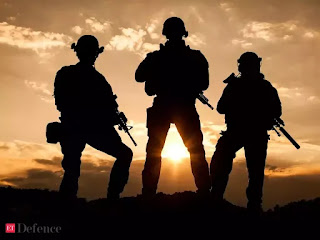Russia wants to make a powerful country
Russia Is making an Army of Robot Weapons, and China's company Is Helping
Russia is fostering a variety of self-governing weapons stages using computerized reasoning as a feature of an eager move upheld by innovative collaboration with adjoining China.
The degree to which Russia has focused on AI in modernizing its military was included in a report named "Man-made brainpower and Autonomy in Russia," which was distributed Monday by the CNA philanthropic exploration and examination bunch situated in Arlington, Virginia.
The report's creators worked intimately with the Pentagon's Joint Artificial Intelligence Center to deliver what the association called "the primary significant piece of US research that expresses contemporary Russia's fundamental drives, accomplishments, and achievements in AI and self-rule endeavors and places those drives inside the more extensive mechanical scene in Russia."
"Russian military specialists have put a premium on building up what they allude to as 'data predominance on the war zone,'" the report expressed, "and AI-improved advances guarantee to exploit the information accessible on the cutting edge combat zone to secure Russia's own powers and reject that benefit to the foe."
While there are huge difficulties and a few reservations toward surrendering basic dynamic capacities to man-made consciousness and away from human personalities, drifts obviously signal that Russian endeavors to present these high level abilities are well in progress. What's more, basic info is coming from China, which the report distinguished as "the critical accomplice for Russia in the circle of high innovation as a rule and computerized reasoning specifically."
This collaboration, a piece of a more extensive vital organization cultivated by Russian President Vladimir Putin and Chinese President Xi Jinping, has just fortified regardless of endeavors by the United States to focus on its top close friend contenders with different assents.
Samuel Bendett, who filled in as a counselor for the report and is an individual from the CNA Center for Autonomy and AI, said a lot of Moscow and Beijing's joint effort occurred outside of the safeguard area.
Simultaneously, their developing military ties have opened the entryway for more thorough work together.
"A large portion of the impacts of this relationship are found in the regular citizen circle—in the cutting edge area and scholastic participation in R&D space," Bendett told Newsweek. "Simultaneously, there is proof of developing two-sided contacts in the military by and large, for example, the interest in essential level activities like Vostok, where order and control collaboration participated."
To act as an illustration of the uplifted degree of trust between two nations who have a background marked by quarrels in past many years overwhelmed by complex Cold War governmental issues, he featured Russia's work in assisting China with building an early admonition framework for rockets.
The possibility of joining AI here "bears watching, as the two nations look to support their C4ISR [an abbreviation alluding to order, control, interchanges, PCs, knowledge, observation and surveillance capabilities], and as the two countries report a developing number of reciprocal military activities and drills," Bendett said.
Yet, as the joint undertakings cherished in Putin and Xi's noteworthy settlement speed up, senior exploration researcher Jeffrey Edmonds takes note of it's getting more hard to perceive precisely what the two forces are really doing.
"From the Russian viewpoint, the rapprochement between the two nations has been quite possibly the most predictable patterns in Russian international strategy for a very long while," Edmonds told Newsweek. "We are seeing that guard collaboration is extending, yet additionally apparently getting more cryptic."




Comments